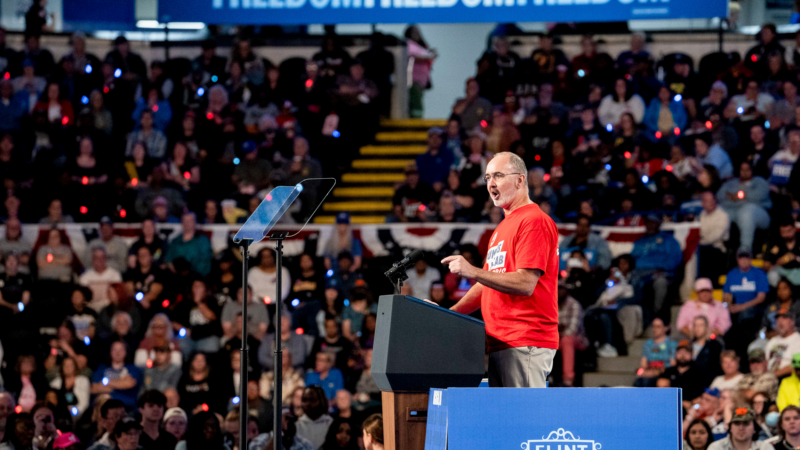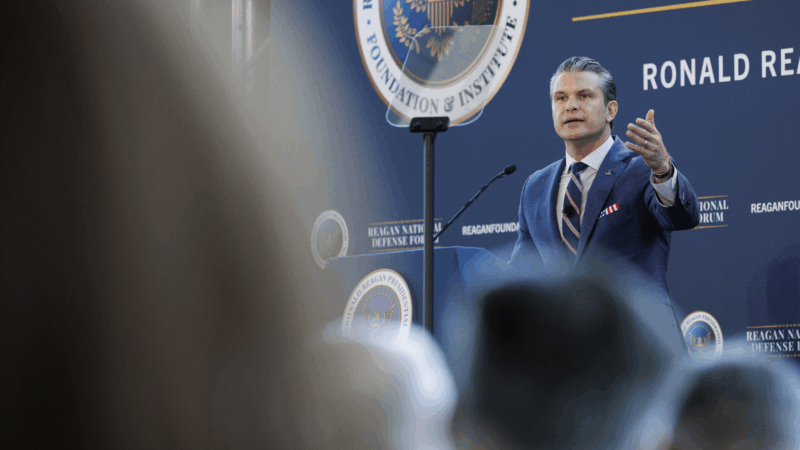UAW President Shawn Fain explains why he supports Trump’s tariffs
President Trump’s announcements on tariffs have dismayed many of his erstwhile supporters on Wall Street. The suddenness — and steepness — of the tariffs announced last Wednesday prompted some global manufacturers to pause shipments to the U.S., and led economists to raise the odds of recession.
But an earlier set of tariffs still has the support of Shawn Fain, president of the United Auto Workers.
Fain supported Democrat Kamala Harris with a fiery convention speech in 2024, and opposes many of Trump’s stances on union labor, but contends the president struck a blow that leaders of both parties have resisted for decades.
Fain represents nearly a million current and retired workers in multiple industries, of whom he estimates a few hundred thousand are now employed by the auto industry. It’s a dramatic decline from the 1.5 million autoworkers alone the UAW represented in the mid-20th century.
Below are highlights from an NPR interview with an unconventional supporter of the tariffs. Some answers have been lightly edited for length and clarity.
He’s not sure about all the tariffs but favors those for his industry.
Fain referred to last Wednesday’s announcement of global tariffs as “reckless,” but firmly supports an earlier round of tariffs on the U.S. auto industry. Those tariffs both help and hurt U.S. auto companies, because they produce so much in Canada and Mexico. Auto parts typically cross the border multiple times as a car is assembled. GM has already said it will move some production back to Indiana — but Stellantis ordered layoffs.
For Fain, tariffs address a historic wrong. “We’ve sat here for the last 30 plus years, with the inception of [the North American Free Trade Agreement] back in 1993-94, and watched our manufacturing base in this country disappear,” he said.
He doesn’t care much about the stock market’s decline.
“You know, half of Americans don’t even have stock,” he said. (Some estimates say well over half of Americans own some stock.)
“Sixty percent of Americans have no retirement savings,” he said. “So when I hear all the crying about the stock market, this is just Wall Street. They’re people that are already rich, and at the end of the day, most working class people are trying to survive right now. And it’s infuriating that our livelihoods have been stripped from us for decades and no one’s cared.”
He acknowledges that tariffs may raise prices.
Most economists have said that the cost of import taxes is passed on to consumers. Asked if that is good for the working class, Fain replied, “Well, no, but that’s a choice. This is the problem with our system. It’s so upside down. The billionaire class and the corporate class, they always get their profits. They always take their cut, and they always pass anything bad on to consumers.”
Fain nonetheless acknowledged that he sees tariffs as a way to prevent exceptionally low prices driven by cheap labor: “The point of tariffs is to eliminate the race to the bottom where we’re exploiting people.”
Despite the suddenness of Trump’s move, he insists the auto industry can adjust.
Fain was calling from Warren, Mich., from which Stellantis recently shifted some production to Mexico. “There’s 2,000 workers that got laid off. They could put them back to work in a month and be building Ram trucks back there,” he added.
He dismisses the idea that the disruption may not work out
Fain rejected Wall Street warnings of a recession, including one by a JP Morgan economist.
“Where was JPMorgan, all these people, when the companies were jacking up prices and price gouging the last three and four years?” he said. “Where was their outcry then? As long as the stock market’s doing good, that’s all they care about.”
He also minimized an idea advanced by many economists: that any factories “reshored” to the U.S. are likely to be highly automated, because of the advances in robotics and the high cost of labor. He said such factories would at least require “skilled trade jobs which are even better paying jobs. We just have to train people.”
“The sad reality of this is [the idea that] it’s a bad thing that we put manufacturing back in this country because labor is expensive. That is pathetic. I believe it was one of the former presidents [who] said, I pity the businessman that wants to make a coat so cheap that the person making the coat will starve in the process. I mean, that is sad,” Fain said.
The audio version of this interview was produced by Mansee Khurana and edited by Arezou Rezvani. The digital version was produced and edited for the web by Majd Al-Waheidi.
Light from satellites will ruin majority of some space telescope images, study says
Astronomers have long been concerned about reflections from satellites showing up in images taken by telescopes and other scientific instruments.
Defense Department is reviewing boat strike video for possible release, Hegseth says
In a speech on Saturday, Defense Secretary Pete Hegseth defended the strikes, saying: "President Trump can and will take decisive military action as he sees fit to defend our nation's interests."
Bama, Miami in, Notre Dame out and Indiana No. 1 in College Football Playoff rankings
Nobody paying attention for the past 24 months would be surprised to see Indiana – yes, Indiana – leading the way into this year's College Football Playoff.
McLaren’s Lando Norris wins first F1 title at season-ending Abu Dhabi Grand Prix
Red Bull driver and defending champion Max Verstappen won the race with Norris placing third, which allowed Norris to finish two points ahead of Verstappen in the season-long standings.
A ban on feeding pigeons ruffles lots of feathers in Mumbai
The pigeon population has exploded — a result of people feeding the birds. For some it's a holy duty and a way to connect to nature. Critics point to health risks tied to exposure to pigeon droppings.
UN humanitarian chief: world needs to ‘wake up’ and help stop violence in Sudan
The UN's top humanitarian and emergency relief official has told NPR that the lack of attention from world leaders to the war in Sudan is the "billion dollar question".








